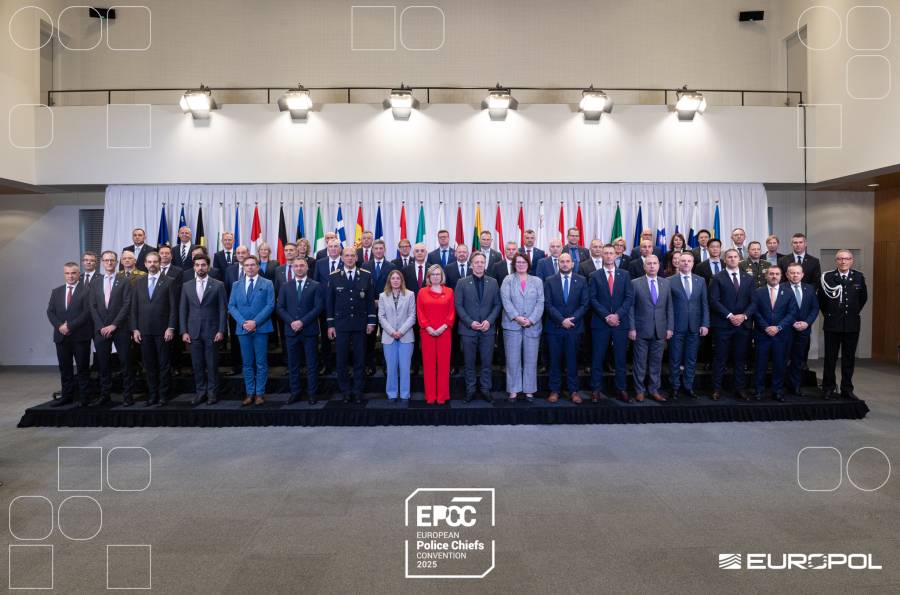This week, more than 400 police chiefs and senior law enforcement officials from 53 countries and 13 international organisations gathered at Europol’s headquarters in The Hague for the European Police Chiefs Convention (EPCC) of 2025.

The annual event brought together the heads of national police organisations, customs administrations, representatives from the European Commission, and international partners to discuss the most pressing threats to security in Europe.
Catherine De Bolle, Europol’s Executive Director, and Lene Steen, Deputy National Commissioner of the Danish Police, opened the conference. Keynote addresses were delivered by EU Commissioner for Internal Affairs and Migration Magnus Brunner, Beate Gminder, Director General for Migration and Home Affairs at the European Commission, and Gerassimos Thomas, Director General for Taxation and Customs Union at the European Commission.
Two panels, building on expert-level workshops held prior, highlighted how criminals are exploiting digital technologies in both violent and financial crime, and how to address these threats internationally.
Catherine De Bolle
Europol Executive Director
The social and economic costs of organised crime are simply too high, so politically, economically, and socially damaging that no single country or organisation, however powerful, can confront them alone. That is why the law enforcement community must redouble its efforts to modernise, strengthen, and deepen international police cooperation.
Crime-as-a-Service: minors increasingly digitally drawn into criminal networks
The panel on Crime-as-a-Service explored how organised crime networks are offering specialised services, from cyberattacks to acts of violence to clients around the world.
Law enforcement experts warned that minors are increasingly targeted and lured through online gaming, social media, and encrypted channels. The phenomenon includes Violence-as-a-Service, where acts of intimidation or assault can be contracted online.
Police chiefs emphasised the need for:
- Centralised, specialised investigative structures to track recruiters, brokers, and enablers across borders;
- Stronger preventive measures to protect vulnerable youths online, including awareness campaigns, school engagement, and ethical guidance in digital spaces;
- Enhanced international cooperation and data sharing, supported by AI and data science, to identify criminal networks faster;
- Regulatory obligation for gaming platforms and social media to prevent harmful content involving minors, and to impose a minimum age for admission to risk-associated platforms and to cooperate with law enforcement when necessary.
Follow the Money: digital finance exploited by criminals
The panel on Follow the Money examined how organised crime, cybercrime, and terrorist financing are exploiting digital financial services, including virtual IBANs, decentralised finance platforms, crypto assets, and fintech tools.
Key challenges identified include:
- Rapidly evolving criminal techniques outpacing law enforcement’s capacity to investigate;
- Shortage of specialists and high-cost investigative tools for blockchain and crypto tracing;
- Obstacles in cross-border investigations, especially involving safe-haven jurisdictions with weaker AML standards.
Police chiefs discussed practical solutions, such as:
- Expanding joint investigative “sprints” to trace and seize criminal assets across borders;
- Pooling resources for specialised investigative tools for crypto and blockchain analysis, as well as boosting investment in training;
- Treating money laundering as a stand-alone criminal offence to speed prosecutions, accepting reasonably suspicion of the provenance of the funds;
- Strengthening public–private partnerships to improve information sharing and early warning systems.
Strengthening Europe’s security architecture
The 14th edition of the EPCC once again provided a platform for hundreds of bilateral meetings and strategic discussions on the future of Europol and European security cooperation.
The European Police Chiefs Convention is Europol’s flagship annual event, bringing together Europe’s law enforcement leadership to address shared security challenges and strengthen operational cooperation.
The EPCC also hosted the Meeting of the Directors General of Customs Administrations, providing a dedicated platform for customs leadership to exchange best practices, coordinate on cross-border threats, and enhance cooperation with other law enforcement partners.
Recognising innovation in law enforcement
The EPCC also celebrated excellence in innovation in policing. The annual Europol Excellence in Innovation Awards were presented to initiatives that demonstrate outstanding creativity and effectiveness in tackling emerging threats, including digital crime, financial crime, and the protection of vulnerable populations.
This year, law enforcement agencies from Portugal, Germany and Norway were honoured for their initiatives in three categories: Ethics, Diversity & Inclusion, Innovative Operation and Technical Innovation.




